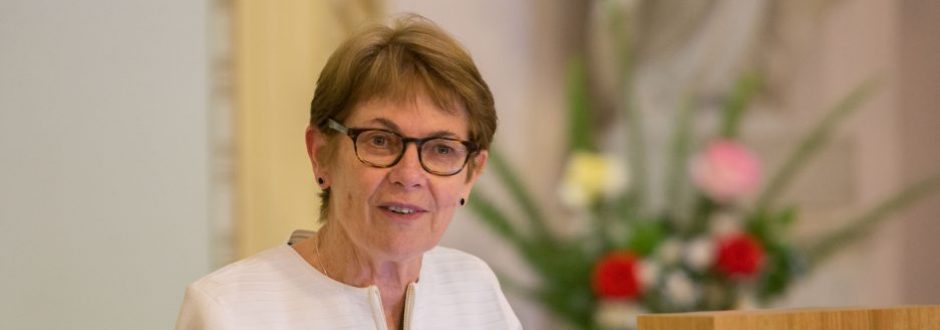The absence of women in the language of the Church matters enormously. Invisibility in words equates with invisibility in consciousness and significance, writes Sister Patty Fawkner SGS in this edition.
What happens when words are excluded and language is lost? This question is explored in two novels I read recently.
Tara June Winch’s Miles Franklin Literary Award winning novel, The Yield, tells the story of cultural dispossession associated with the loss of language and the cultural enrichment when a language is reclaimed.
Aware that he will soon die, Albert ‘Poppy’ Gondiwindi puts pen to paper in his determination to record the language of his people. He creates a dictionary of Wiradjuri words. He goes far beyond a simple definition and gives the context of a particular word for his personal and tribal history. A poignant example reveals the personal and political potency of words:
Gaol, shut place – ngunba-ngidyala When your own daughter and then your grandson get put in gaol it must make the family look like trouble, I’m sure. But it isn’t so simple. Both Jolene and Joey made mistakes but the punishments outweighed the crimes. As much as the government want to convince the population otherwise, it is an old thinking – locking us up as a solution. The closed place, the shut place – the ngunba-ngidyala – is first built in the mind, and then it spreads.
When a language dies, humanity is impoverished. When a language is reclaimed, storytelling and identity, heritage and culture can be celebrated.
The second novel, The Dictionary of Lost Words by Pip Williams, is based on true events surrounding the compilation of another dictionary, this time the Oxford English Dictionary. Sir James Murray leads a team of lexicographers to gather words for the very first edition of the dictionary. The central character, Esme, spends her early years under a table in the Scriptorium where her widowed father works on Murray’s staff.
A slip of paper with the word ‘bondmaid’ flutters to the floor within Esme’s reach. She secretes the word and thus begins her collection of various words that are lost or deliberately discarded by the lexicographers.
As she grows up and eventually works in the Scriptorium, Esme discovers many things about words:
- All words are not equal;
- Words and meanings related to the experience of women and the poor often go unrecorded;
- The words women use are not seen as significant; and
- Words chosen by men to describe women are often inadequate.
The original version of the Oxford English Language was a marvellous achievement, taking years and the dedication of many to achieve. Yet, as Pip Williams’ novel reveals, the final product was flawed and gendered.
It occurs to me that much of our contemporary language is flawed and gendered. I have often wondered what are the corresponding male words for ‘whore’ and ‘slut’? Is ‘dog’ the male equivalent for ‘bitch’? If so, it doesn’t carry the same emotive punch, just as ‘bachelor’ doesn’t carry the same negative connotations as ‘spinster’.
I continue to be dismayed and disappointed that Church language is flawed and gendered.
Pope Francis, whom I admire and whose leadership I genuinely appreciate, has just released his latest encyclical, Fratelli Tutti – Brothers All. It is a wonderful call to respond with compassion and solidarity to the challenges confronting our world. However, once again, women have to ask the question as to whether the encyclical is intended for them. No such second guessing for men.
Of course women are not excluded, says the Vatican in defence. As reported in The Tablet, Vatican News editorial director Andrea Tornielli explained, “the formulation of the title in no way intends to exclude women, that is, more than half of the human race”. Tornielli goes on to explain that Pope Francis used the words “to initiate a reflection on something he cares about very deeply: namely, fraternity (italics mine) and social friendship. He therefore addresses all his sisters and brothers, all men and women of good will who populate the earth: everyone, inclusively, and in no way exclusively.”
The irony of using ‘fraternity’ to explain the ‘inclusiveness’ of the encyclical, seems to have been lost on Tornielli.
But the words don’t match the intention. Frankly, good intentions are not good enough.
It is not only encyclicals. So much of our liturgical language is gendered. Each Sunday I pray in the Creed that I believe in Jesus Christ who “for us men and for our salvation” came down from heaven.
The examples abound and so do the excuses that minimise the impact of exclusive language and the reassurances that the intention is to include all. Yet again, good intentions are not good enough.
The novels of Tara June Winch and Pip Williams remind me that words are political and powerful. Albert Gondiwindi died a happy man, comforted by the knowledge that he had reclaimed a language that helped him to discover who he was and who his people were. It validated his story and his experience.
A premise of The Dictionary of Lost Words is that women’s experience is invalidated when words for them or describing their experience is invisible in the language. The absence of women in the language does matter.
The absence of women in the language of the Church matters enormously. Invisibility in words equates with invisibility in consciousness and significance.
“Words are our tools of resurrection,” claims Esme’s godmother, Ditte, early in The Dictionary of Lost Words. The character of Ditte is based on the historian, Edith Thompson, who made a significant contribution by the words she gathered for the first edition of the Oxford English Dictionary.
Words are tools of resurrection. When, oh when, will that be so for women in the Catholic Church?
